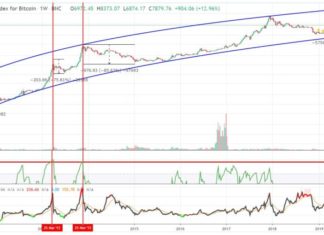[ad_1]
A new World Economic Forum report recently released has identified more than 65 ways blockchain can be applied to the world’s most serious environmental challenges and the report calls for new global platforms to incubate ‘responsible blockchain ecosystems’ rather than just individual applications or companies.
Produced in collaboration with PwC and released at the Global Climate Action Summit in California, Building Block(chain)s for a Better Planet also identifies eight game-changers where the technology can fundamentally transform the way the world manages its natural resources. These range from decentralizing management of natural resources such as energy and water, to creating more transparent supply chains that drive greater sustainability, and providing new mechanisms for raising the trillions of dollars that will be needed to deliver low-carbon and sustainable economic growth.
“Blockchain’s potential to fundamentally redefine how business, government and society operate has generated considerable hype,” said Sheila Warren, Head of Blockchain and Distribute Ledger Technology at the World Economic Forum’s Centre for the Fourth Industrial Revolution. “Despite this hype, there are many challenges to overcome – it is still a nascent technology undergoing rapid development. Now is the right time for stakeholders to work together to ensure the development of responsible blockchain solutions that are good for people and the planet.”
Celine Herweijer, Partner, PwC UK, added: “It is important for anyone thinking about developing or investing in a blockchain application for the environment to take a step back and ask three essential questions: will blockchain solve the actual problem, can downside risks or unintended consequences be acceptably managed, and has the right ecosystem of stakeholders been built?”
Blockchain-enabled solutions are currently being explored to improve the sustainability of global supply chains and could help overcome illegal activities by tracking fish from “bait to plate”, or commodities like palm oil, beef and soy from “farm to fork”. Such transparency is vital in influencing consumer decisions, updating supply chain practices and triggering new governance arrangements. Blockchain-enabled smart contracts could, for instance, be used to underpin innovative tenure arrangements that give specific resource rights to communities or fishers.
According to the report, these and other opportunities have been largely untapped by developers, investors and governments, and represent an opportunity to unlock and monetize value that is currently embedded in environmental systems.
If harnessed in the right way, blockchain has significant potential to enable the transition to cleaner and more resource-preserving decentralized solutions, unlock natural capital and empower communities. This is particularly important for the environment, where the tragedy of the commons and challenges related to non-financial value are prevalent.
“If history has taught us anything, it is that these transformative changes will not happen automatically,” said Dominic Waughray, Head of the World Economic Forum’s Centre for Global Public Goods. “They will require deliberate collaboration between diverse stakeholders ranging from technology industries through to environmental policy-makers, and will need to be underpinned by new platforms that can support these stakeholders to advance not just a technology application, but the systems shift that will enable it to truly take hold.”
Building Block(chain)s for a Better Planet forms part of a series of reports from the Fourth Industrial Revolution for the Earth project, run in association with the World Economic Forum Centre for the Fourth Industrial Revolution.
Read the full report here
- WEF Report: 65+ Ways Blockchain Technology Can Tackle Environmental Challenges – September 17, 2018
- France Goes Bullish on ICOs – Opens Doors to Tokenomics – September 17, 2018
- Tokenomy Announces the Full Launch of Tokenomy Exchange – September 17, 2018
- Pandora Boxchain Creates Reputation Token for the Ethereum network – September 13, 2018
- DNAtix Sets a New Record: Compresses DNA Sequences to 99 per cent of Original Size – September 12, 2018
- Blockchain Startup Femergy Launches Global Entrepreneurship Platform To Tackle Tech Gender Gap – September 12, 2018
- First Crypto Marathon held in Lithuania – Runners win Tokens – September 11, 2018
- EU Holds Off on Crypto Regulation – September 11, 2018
- European Parliamentarians Propose EU-Wide ICO Regulatory Framework – September 6, 2018
- Former Prime Minister of Estonia Becomes New Chairman of Blockchain Startup Lympo – September 6, 2018
- Warhol Goes Crypto – Multi Million Dollar Group Sale to 100 Participants Using Blockchain-Fueled Maecenas Platform – September 5, 2018
- Credits and Lenovo to join forces on the Internet of Things – September 5, 2018
- Blockchain Startup Wala Wins 2018 Zambezi Prize for Innovation in Financial Inclusion – September 5, 2018
- Stellar Lumen Joins Lykke Exchange – September 3, 2018
- Arteïa, The Ultimate Decentralized Cataloging Solution To Manage The Value Of Art Collections – August 30, 2018
- Neon Exchange (NEX) – First Regulated Exchange Security Token in Europe – Announces ICO – August 30, 2018
- Evident Proof Passes Smart Contract Audit with a 100 Percent Score – August 29, 2018
- Blockchain Platform Orbs Marks Strategic Expansion Into South Korea – August 29, 2018
- Lisk Rolls Out Lisk Core 1.0 to Mainnet – August 29, 2018
- One in Four Smart Contracts Have Critical Vulnerabilities – AmaZix and Hosho partner to bring further security to the crypto community – August 29, 2018
[ad_2]
Source link






